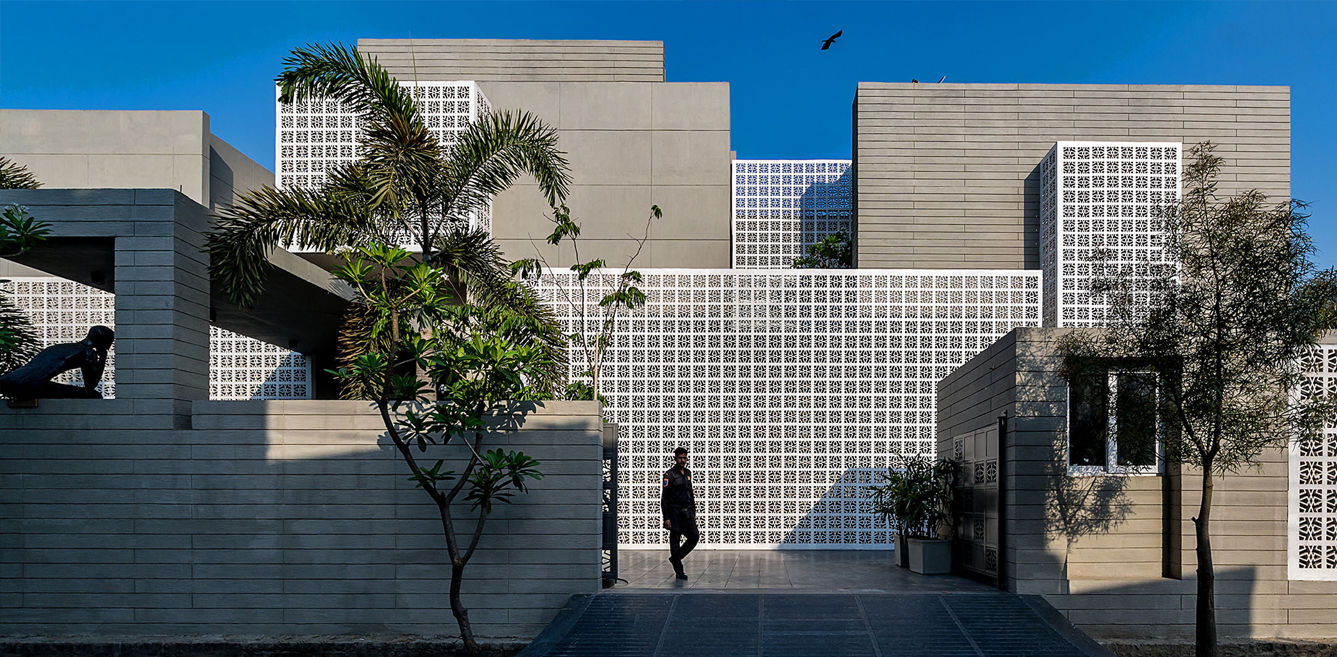



The historical city of Lucknow has a rich heritage that extends to its architecture as well, with numerous buildings dating back to the 18th century. The site for this house lies along a busy arterial road and is on the peripheral edge of an extensive plotted development for private homes. The project is planned to allude to the traditional Indian courtyard house design and in response to the climate of the location. Temperatures in the long summer months here are in excess of 35°C, with the sun in the southern hemisphere.
The extensive requirements of this 6-bedroom house are interspersed with sheltered open terraces and landscaped gardens around a two-floor-high, naturally-ventilated courtyard. In addition to the six bedrooms, the client’s brief necessitated a prayer room, a study, a movie lounge, and utility areas. Each space within the house opens into sheltered open terraces and decks. The house is designed for four generations of the family to live together, with the oldest generation housed at the ground level and the younger generations on the floor above.
It was, therefore, important to create multiple private spaces whilst integrating them together simultaneously. Patterned screens derived from traditional Indian architecture and the famous Lucknowi chikan embroidery sheath outdoor seating areas for each room on the south, west, and east sides. These screens provide shelter from the sun, create different light patterns throughout the day and mitigate traffic noise from the busy arterial road on the southern side.
The use of these screens also helps to reduce the heat gain substantially, and thereby, makes the building more energy efficient. Large glass windows on the northern side allow indirect light to infuse the internal spaces of the house.
Varying volumetric proportions with differing sectional spaces create an individual identity to each living space with the courtyard cohesively integrating them together. Built almost entirely in raw concrete, a natural palette of sandstone and wood with muted colours, vivid Indian art and landscape are brought together in different compositions in each of the internal volumes. A large garden on the north, penetrating up to the internal courtyard between rooms, has partial shadows at most times of the day, allowing it to be used in the extensive summers too.
The use of screens to reduce heat, solar panels on the rooftop to harness energy for water heating and general lighting, recycling of water, sewage treatment and reuse of water for gardening, rainwater harvesting, and facilitation of natural ventilation and lighting throughout the house, render the design sustainable and energy-efficient. A series of experiences are created in this house that by its design facilitates natural ventilation and sunlight within, and is simultaneously contextual to the location, sun articulation, tradition, culture, and social aspects.
A home is more than just walls and a roof; it’s a sanctuary where life…
On the night of 1 April, Mumbai revealed her rebellious, punk-inspired side as Vivienne Westwood…
The architectural landscape of Rajasthan is steeped in a rich tradition of historic masonry, reflecting…
Are you a corporate employee spending 10+ hours in an ordinary cubicle that's fused in…
Modern Indian homes are no longer bound by their physical vicinity. They have outgrown our…
Häcker Kitchens, a brand synonymous with quality and innovation, has a rich legacy that spans…